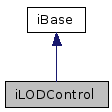iLODControl Struct Reference
[Mesh support]
The iLODControl interface represents an object that has controllable LOD features.
More...
#include <iengine/lod.h>
Inheritance diagram for iLODControl:

Public Member Functions | |
| virtual void | GetLOD (iSharedVariable *&varm, iSharedVariable *&vara) const =0 |
| Return the variables used by lod. | |
| virtual void | GetLOD (float &m, float &a) const =0 |
| Get the current LOD function. | |
| virtual int | GetLODPolygonCount (float lod) const =0 |
| Get a rough estimate of the number of polygons for a given LOD value (between 0 and 1, similar to the value used by SetLOD()). | |
| virtual void | SetLOD (iSharedVariable *varm, iSharedVariable *vara)=0 |
| Set LOD using variables. | |
| virtual void | SetLOD (float m, float a)=0 |
| Set a parameters for a function to compute LOD for the given LOD control. | |
Detailed Description
The iLODControl interface represents an object that has controllable LOD features.The LOD manager can work with this.
Definition at line 37 of file lod.h.
Member Function Documentation
| virtual void iLODControl::GetLOD | ( | iSharedVariable *& | varm, | |
| iSharedVariable *& | vara | |||
| ) | const [pure virtual] |
Return the variables used by lod.
If lod was not set using variables then varm and vara will be set to 0.
| virtual void iLODControl::GetLOD | ( | float & | m, | |
| float & | a | |||
| ) | const [pure virtual] |
Get the current LOD function.
| virtual int iLODControl::GetLODPolygonCount | ( | float | lod | ) | const [pure virtual] |
Get a rough estimate of the number of polygons for a given LOD value (between 0 and 1, similar to the value used by SetLOD()).
Note that a mesh object that doesn't support LOD should always return the same number of polygons.
| virtual void iLODControl::SetLOD | ( | iSharedVariable * | varm, | |
| iSharedVariable * | vara | |||
| ) | [pure virtual] |
Set LOD using variables.
| virtual void iLODControl::SetLOD | ( | float | m, | |
| float | a | |||
| ) | [pure virtual] |
Set a parameters for a function to compute LOD for the given LOD control.
The function is as follows:
float lod = m * distance + a;
The result of this function will be capped to the [0,1] range with 0 meaning worst quality possible (highest speed) and 1 highest quality.
The documentation for this struct was generated from the following file:
- iengine/lod.h
Generated for Crystal Space by doxygen 1.4.7
